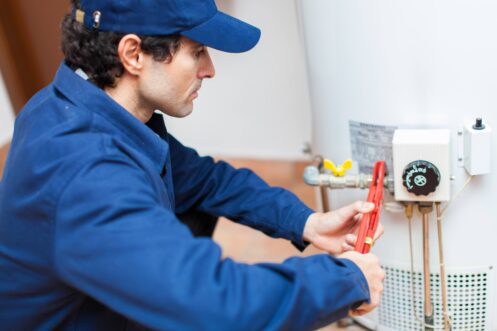Temperature fluctuations brought about by spring weather pose several threats to your home’s plumbing system. This is why prioritizing plumbing maintenance is a key characteristic of a responsible homeowner. Springtime brings about melting snow and a lot of stormy weather, both of which add pressure to your home’s drainage system and sewer lines. And as the ground thaws, it causes the soil to shift, which can crack underground pipes. No matter what plumbing problems you experience, hiring a licensed plumber is the best way to protect your home.
1. Washing Machine Leaks
You may notice an increase in laundry loads in the spring as you and your family start spending more time outdoors. But the more you use the washer, the more wear and tear it endures, increasing the risk of leaks. Other common plumbing problems that can affect washing machines include blocked drains and leaking pipes, which tend to increase in the spring.
Knowing what to check for is essential when fixing a washing machine leak since there might be several problems. Plumbers usually start by checking the drain hose, cleaning the filter, leveling the appliance and replacing door gaskets. More serious problems, like those involving the water pump or motor coupler, require more complicated fixes and can be very expensive. A plumber can help you determine whether it’s more cost-effective to fix the leak or replace the washer.
2. Clogged Drains
When you spend more time outside during spring doing things like gardening and yard maintenance, you need to take measures to keep debris like grass, leaves and dirt from winding up in your drains. And since spring rains can wash debris into outdoor drains, creating clogs, it’s important to protect them, too. Thawing ice and melting snow will make clogs worse. When left unfixed, a clogged drain can cause water to back up and overflow into your home. This can easily result in water damage to floors, walls and ceilings.
Professionals typically use drain snakes, hydro jetting or chemical drain cleaners to get rid of clogs. In the case of severe clogs, plumbers may use a combination of these solutions. Attempting to unclog a drain yourself may complicate the problem by leading to water pressure issues and sewage backups.
3. Burst Pipes
Experts agree it’s best to have a plumber insulate the pipes in your home, especially if you live in regions with extremely low temperatures. This helps protect the pipes from freezing and bursting. Frozen pipes are especially concerning during the spring because, as the ice thaws, it increases pressure, increasing the likelihood of a burst. Some of the best insulation materials to use are fiberglass pipe wrap and heat tape. Many experts also recommend installing rubber pipe sleeves.
Fixing frozen pipes usually requires extensive work and the use of specialized tools like heat guns or electric pipe thawing machines. A plumber will assess the damage to determine whether to replace a section of the pipe or the whole thing. It might be possible to seal leaks caused by burst pipes using pipe clamps.
4. Running Toilets
Using more water for spring activities, like filling swimming pools and washing cars, puts extra pressure on your plumbing system. This can translate into fluctuations in your home’s water pressure, which can complicate running toilet problems. There’s also a higher chance of tree roots infiltrating underground pipes as they seek moisture, causing leaks and running toilet issues.
To fix a running toilet, a plumber may need to adjust the float or replace the flapper or fill valve. There could also be a problem with the flush valve. If it isn’t installed correctly, it will cause the toilet to run constantly. If none of these remedies fixes the problem, the plumber might inspect the overflow tube height or reduce the amount of water in the tank. When the problem stems from tree root intrusion, a plumber may use hydro jetting or root cutter technologies.
5. Garbage Disposal Jams
Spring is a great time to cook and enjoy meals outside, but never pour grease down your drains as this can lead to major clogs. Also, be mindful about how you use your garbage disposal. Common foods that can easily jam a garbage disposal include bones, fruit pits, coffee grounds, eggshells and stringy vegetables like celery or corn husks.
If you experience an unfortunate scenario involving a jammed garbage disposal, keep the unit turned off, and don’t use the sink until you get the problem fixed. Clearing the jam will require cutting power to the unit, reaching down into the drain (usually with a tool of some type), dislodging the stuck food and possibly working on the impeller assembly. It also involves resetting the motor. If you have a really old model, it may not have a reset feature. A plumber will have the correct tools to remove the lodged item without damaging the disposal.
6. Sump Pump Failure
Sump season — from late winter through early spring — is the time of year when sump pump issues are most likely to occur. Sump pump problems are more common then because the rising temperatures cause the ground to thaw, and until the ground completely thaws, the water that the thawing creates cannot seep into it. This means it has nowhere to go, so it pools as standing water. When this happens, basement flooding is almost inevitable as heavy rains overwhelm the pump. External factors that affect groundwater pooling include water table levels and grading around the property.
Before they can repair a sump pump that isn’t working, plumbers need to figure out whether the issue is with pooling water or the pump itself. If it’s pooling water, a plumber may need to install a well-point system to draw the water out. Other potential solutions include digging a trench to divert water farther away from the house or extending the pump line. If the problem is the pump itself, the plumber will check for motor and impeller damage. The float switch or sensor mechanism might be at fault as well.
7. Leaky Outdoor Faucets
Freezing temperatures during the winter can freeze outdoor faucets. When they thaw in the spring, they can crack and leak. Soil movement during spring thaws also causes faucet leaks by disrupting faucet connections. If you don’t fix them, these leaks can result in wasted water, higher water bills and damage to your home’s foundation.
Repairs for leaky outdoor faucets are usually straightforward and require tightening loose fittings and replacing damaged parts. For homes that have a lot of problems with leaky outdoor faucets, it may be necessary to insulate the connected pipes to minimize the risk of freezing. Plumbers may also recommend installing leak detectors for the faucets. Flow sensors on leak detectors make it possible to detect both small and large leaks. Changing the O-rings or washers on the valve stem are other possible solutions for leaky outdoor faucets.
You can make your home safer and more comfortable with our first-class plumbing, HVAC, insulation and electrical services. To schedule a plumbing repair in Raleigh, NC, contact Thermo Direct today.









